The poison of Moscow

Poisoning political critics and enemies -- then there were no adversaries -- was a widespread custom in the Soviet Union since Stalin. It was an effective and discreet practice to remove dissidents or simple people who were uncomfortable for the Regime. Poisoning cunningly was in the workbooks of what we assumed to be the extinct KGB. And there are many names of victims who have come to know.
And it does not seem that custom and technique have disappeared with the apparent change in the current Russian politics, so doubtfully democratic. The umbrella technique, which consists of shooting a little less than instantaneous poison into the back of the passer-by to be eliminated from an apparent umbrella, is still in use, as was recently the case in London.
The poisoning, alternating with head shots, includes a long list of victims over the last twenty years both in Russia itself and abroad. Being critical of the government means, under Vladimir Putin's aegis, just as in the Communist years, a silent death sentence without trial or scandal.
Alexie Navalni, a brilliant and courageous opponent of Putin, was poisoned at an airport in Siberia with a cup of tea he had taken when he was about to board a plane to campaign in a local election. Already in flight he felt sick and passed out in the bathroom cabin. Although the plane made an emergency landing, the doctors who immediately knew he had been poisoned could do little.
He has been in a coma for several days, while the Putin government cynically deplores the case and promises an investigation that is quite likely to clarify nothing that is no longer known. Both France and Germany offered to take him in and make him available to specialist doctors who could treat him and save his life. But Moscow refused the offer.
The fear of being poisoned was already common among politicians in the Soviet Union. When the then president of Romania, Nicolau Ceaucescu, visited Spain during the transition years, the protocol that organized the visit was surprised not only by the extravagance of the woman, Elena, but also by the demand for a privileged place for the fitting room.
Initially nobody knew what it was about: some imprecise interpretation of the language was thought. But it was soon found that the word was indeed correct. The tester did not leave the Romanian dictator's side, followed him everywhere and tested what he was about to ingest, including a simple glass of water, in anticipation of being poisoned.
It was very unpleasant when on a visit he was offered something to watch the tester take a sip and wait near the private physician to see if he felt any reaction. It was particularly difficult to see the show at official dinners and lunches. In some cases the tester did his job in the kitchen but then watched to see if it was the same thing that arrived at the table.

